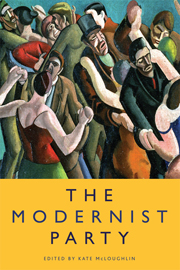Book contents
- Frontmatter
- Contents
- A Note of Thanks
- The Guest List
- Introduction: A Welcome from the Host
- 1 ‘The dinner was indeed quiet’: Domestic Parties in the Work of Joseph Conrad
- 2 Prufrock, Party-Goer: Tongue-Tied at Tea
- 3 Party Joyce: From the ‘Dead’ to When We ‘Wake’
- 4 ‘Looking at the party with you’: Pivotal Moments in Katherine Mansfield's Party Stories
- 5 Virginia Woolf's Idea of a Party
- 6 Proustian Peristalsis: Parties Before, During and After
- 7 ‘Ezra through the open door’: The Parties of Natalie Barney, Adrienne Monnier and Sylvia Beach as Lesbian Modernist Cultural Production
- 8 ‘Indeed everybody did come’: Parties, Publicity and Intimacy in Gertrude Stein's Plays
- 9 The Interracial Party of Modernist Primitivism and the Black ‘After-Party’
- 10 The Party In Extremis in D. H. Lawrence's Women in Love
- 11 Bohemian Retrospects: Ford Madox Ford, Post-War Memory and the Cabaret Theatre Club
- 12 ‘Pleasure too often repeated’: Aldous Huxley's Modernity
- Index
3 - Party Joyce: From the ‘Dead’ to When We ‘Wake’
Published online by Cambridge University Press: 05 April 2014
- Frontmatter
- Contents
- A Note of Thanks
- The Guest List
- Introduction: A Welcome from the Host
- 1 ‘The dinner was indeed quiet’: Domestic Parties in the Work of Joseph Conrad
- 2 Prufrock, Party-Goer: Tongue-Tied at Tea
- 3 Party Joyce: From the ‘Dead’ to When We ‘Wake’
- 4 ‘Looking at the party with you’: Pivotal Moments in Katherine Mansfield's Party Stories
- 5 Virginia Woolf's Idea of a Party
- 6 Proustian Peristalsis: Parties Before, During and After
- 7 ‘Ezra through the open door’: The Parties of Natalie Barney, Adrienne Monnier and Sylvia Beach as Lesbian Modernist Cultural Production
- 8 ‘Indeed everybody did come’: Parties, Publicity and Intimacy in Gertrude Stein's Plays
- 9 The Interracial Party of Modernist Primitivism and the Black ‘After-Party’
- 10 The Party In Extremis in D. H. Lawrence's Women in Love
- 11 Bohemian Retrospects: Ford Madox Ford, Post-War Memory and the Cabaret Theatre Club
- 12 ‘Pleasure too often repeated’: Aldous Huxley's Modernity
- Index
Summary
What is a ‘party’? (1) a partitioning, isolating one group from another, (2) an orgy, or partouze, as we say in French, wherein the participants are linked erotically, and (3) a hand, or partie, the regulated moment in a game, a collective diversion. In Sade, in Fourier, the party, the highest form of societary or Sadian happiness, has this threefold character: it is a worldly ceremony, an erotic practice, a social act. (Roland Barthes, Sade, Fourier, Loyola)
In the Hades episode of Ulysses (1922), Bloom and a group of acquaintances are sitting in a horse-drawn carriage that will take them to Prospect cemetery in Glasnevin. They are travelling together to bring their friend Dignam to his final rest. After a short while, they notice disquieting details. Martin Cunningham brushes some crumbs from under his thighs, and Mr Power avers: ‘Someone seems to have been making a picnic party here lately.’ What follows provides one of the numerous narrative ellipses of this section:
All raised their thighs and eyed with disfavour the mildewed buttonless leather of the seats. Mr Dedalus, twisting his nose, frowned downward and said:
—Unless I am greatly mistaken … What do you think, Martin?
—It struck me too, Martin Cunningham said.[…]
Mr Dedalus sighed resignedly.
—After all, he said, it's the most natural thing in the world. (U, p. 74)
- Type
- Chapter
- Information
- The Modernist Party , pp. 64 - 78Publisher: Edinburgh University PressPrint publication year: 2013

